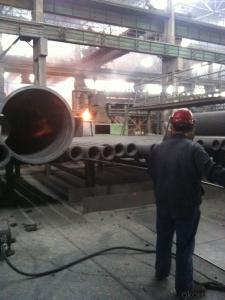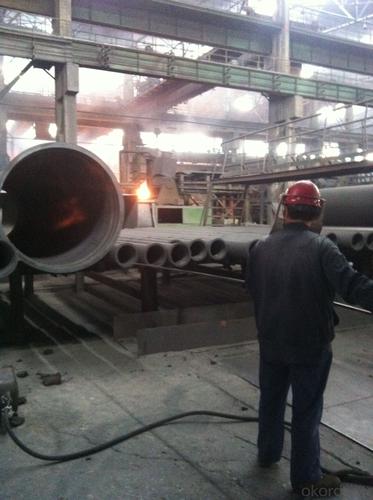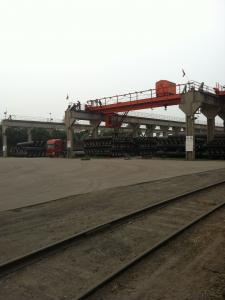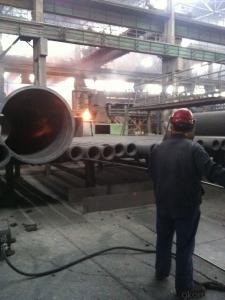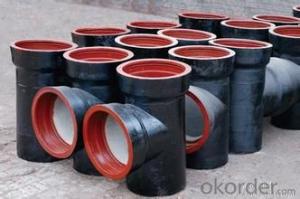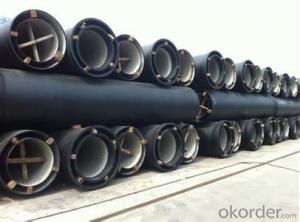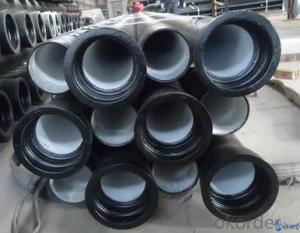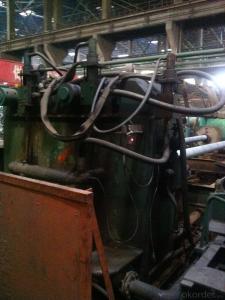DUCTILE IRON PIPE AND PIPE FITTINGS K9 CLASS DN1100
- Loading Port:
- Tianjin
- Payment Terms:
- TT OR LC
- Min Order Qty:
- 23 pc
- Supply Capability:
- 3000 pc/month
OKorder Service Pledge
OKorder Financial Service
You Might Also Like
Material : Ductile Cast Iron
Size Range : DN 80mm to DN 2000mm
Unit Effective Length : 6m or 5.7m
Manufacture Standard: ISO 2531:1998/ EN 545:2006/EN 598:2007
Annual capacity : 200,000 tons
Coating Exterior: Zinc 130g/m2 according to ISO 8179-1 and bitumen coating 70 microns.
Cement Interior: Portland Cement/ High Alumina Cement/ Sulphate Resisting Cement Lining according to ISO 4179
Special requirements on external coating and internal lining can be applied
We also provide accessories such as SBR/EPDM rubber gaskets, lubricant paste, pipe caps, PE sleeves, etc.
Additional Parts:
Each pipe is strictly inspected according to related standard to ensure permanently high performance.
Easy Installation at site and service free for life
Long Service Lifespan
Quotation will arrive you within 24hours once we get your inquiry.
We guarantee offering you a competitive price.
A copy of original inspection reports of pipes will be offered after shipment.
Photos of loading process will be sent to the customer after shipment effect.
We will follow-up the delivery progress after shipment effect and update to the customer on weekly basis.
- Q: How is ductile iron pipe different from cast iron pipe?
- Ductile iron pipe and cast iron pipe are commonly used in plumbing and drainage applications, but they have differences in composition, strength, and flexibility. To begin with, ductile iron pipe is made from a different iron alloy than cast iron pipe. Ductile iron contains more carbon and silicon, which gives it increased strength and durability. On the other hand, cast iron pipe is made from gray iron, which has higher carbon content but lacks the flexibility of ductile iron. Moreover, ductile iron pipe is renowned for its superior strength and resistance to impact. It can withstand higher pressures and is less likely to crack or break under heavy loads or external forces. Cast iron pipe, although strong, is more brittle and prone to fractures and failures. Another significant distinction is the flexibility of ductile iron pipe. It possesses greater flexibility and can endure bending and deformation without fracturing. This flexibility facilitates easier installation, particularly in areas with uneven terrain or where ground movement may occur. In contrast, cast iron pipe is less flexible and more rigid, making it unsuitable for applications that require flexibility. Additionally, ductile iron pipe has a smoother interior surface compared to cast iron pipe. This smoothness reduces friction, enhances flow efficiency, and minimizes the accumulation of sediment and deposits within the pipe, resulting in improved water flow and reduced maintenance needs. In conclusion, ductile iron pipe sets itself apart from cast iron pipe due to its composition, strength, flexibility, and smooth interior surface. Ductile iron offers superior strength, impact resistance, and flexibility, making it the preferred choice in various plumbing and drainage applications.
- Q: How does ductile iron pipe perform in extreme temperatures?
- Ductile iron pipe performs well in extreme temperatures due to its ability to expand and contract without cracking or breaking. It has a high thermal conductivity, allowing it to efficiently transfer heat without compromising its structural integrity. Additionally, its corrosion resistance properties make it suitable for both hot and cold environments, ensuring long-term performance even in extreme temperature conditions.
- Q: How are ductile iron pipes protected against interior corrosion?
- Cement mortar lining is utilized to protect ductile iron pipes against interior corrosion. This process involves the application of a layer of cement mortar to the inner surface of the pipe. By acting as a protective barrier, the cement mortar prevents the corrosive elements in the water or fluid from directly contacting the iron material. To apply the cement mortar lining, the interior surface of the ductile iron pipe is initially prepared by removing any loose scale or debris. Next, a mixture of cement, sand, and water is prepared to create a paste-like consistency. Skilled workers can then manually apply this mixture to the interior surface of the pipe or use a spinning machine. Once the cement mortar lining is applied, it must cure for a specific period, typically around 24 hours. During this curing process, the cement mortar hardens and forms a dense protective layer on the pipe's inner surface. The cement mortar lining provides several advantages in safeguarding ductile iron pipes against corrosion. It creates a smooth and continuous surface that prevents direct contact between the water or fluid and the iron material, thus reducing the risk of corrosion. Additionally, the lining helps to minimize friction within the pipe, thereby enhancing flow efficiency. It is crucial to regularly inspect and maintain the cement mortar lining to ensure its effectiveness in preventing corrosion. Over time, the lining may develop cracks or deteriorate, compromising its protective properties. Therefore, periodic inspections are necessary to repair or replace the lining as required, ensuring the integrity of the ductile iron pipes and preventing interior corrosion.
- Q: Are ductile iron pipes suitable for bridge piers or abutments?
- Yes, ductile iron pipes are suitable for bridge piers or abutments. Ductile iron is a strong and durable material that is widely used in various infrastructure projects, including bridges. It has excellent mechanical properties, including high tensile strength and impact resistance, making it capable of withstanding heavy loads and external forces. Additionally, ductile iron pipes are highly resistant to corrosion and have a long service life, which is crucial for structures like bridge piers or abutments that are exposed to harsh environmental conditions. The versatility and reliability of ductile iron pipes make them a suitable choice for supporting and reinforcing bridge structures, ensuring their safety and longevity.
- Q: Can ductile iron pipe be used for hydropower systems?
- Ductile iron pipe is perfectly suitable for hydropower systems. It is renowned for its robustness, longevity, and ability to resist corrosion, making it an excellent option for numerous applications, including hydropower systems. The remarkable tensile strength of ductile iron enables it to endure the immense pressure and heavy loads associated with such systems. Additionally, its resistance to corrosion makes it ideal for use in water environments, ensuring a lengthy lifespan and minimal maintenance requirements. Consequently, ductile iron pipe can effectively serve hydropower systems by offering a dependable and efficient solution for water transportation and infrastructure support.
- Q: How do ductile iron pipes perform in earthquake-induced ground movements?
- Ductile iron pipes perform well in earthquake-induced ground movements due to their inherent strength and flexibility. The material's ductility allows it to withstand ground shaking, ground settlement, and other dynamic forces during an earthquake. This flexibility helps prevent the pipes from fracturing or bursting, minimizing the risk of water or sewage leaks. Additionally, ductile iron pipes are designed to accommodate ground movements by using joints that can expand and contract, ensuring their stability and preventing damage.
- Q: Can ductile iron pipes be used for irrigation of golf courses?
- Yes, ductile iron pipes can be used for irrigation of golf courses.
- Q: Are ductile iron pipes suitable for installation in areas with high groundwater contamination and soil erosion?
- Areas with high groundwater contamination and soil erosion are typically well-suited for the installation of ductile iron pipes. This is due to the fact that ductile iron pipes are renowned for their durability, strength, and corrosion resistance. They exhibit exceptional resistance to acidic and alkaline soils, rendering them appropriate for regions with elevated levels of groundwater contamination. Moreover, the robust construction of ductile iron pipes grants them a formidable resistance to soil erosion. They are engineered to endure a range of external forces, including the pressure exerted by the surrounding soil and the potential movement resulting from erosion. Consequently, they are a dependable choice for installation in areas prone to soil erosion. Nonetheless, it is vital to acknowledge that while ductile iron pipes can withstand high levels of groundwater contamination and soil erosion, the implementation of proper installation techniques and maintenance practices is crucial to ensure their longevity and optimal performance. Regular inspections, meticulous backfilling, and the application of suitable protective coatings should be employed to maximize the lifespan of the pipes. To sum up, ductile iron pipes are generally well-suited for installation in areas characterized by high groundwater contamination and soil erosion. Their durability, strength, resistance to corrosion, and high resistance to soil erosion establish them as a reliable choice for such environments. However, adhering to proper installation and maintenance practices is imperative to guarantee their longevity and optimal performance.
- Q: Can ductile iron pipes be used for trenchless installations?
- Indeed, trenchless installations can utilize ductile iron pipes. Horizontal directional drilling (HDD) and pipe bursting techniques have gained considerable popularity as alternatives to the conventional open-cut trenching method for underground utility installations. Ductile iron pipes possess the necessary qualities of strength, durability, and flexibility, rendering them suitable for trenchless installations. They can endure the formidable forces encountered during HDD and pipe bursting operations without jeopardizing their structural integrity. Moreover, ductile iron pipes exhibit remarkable resistance to corrosion, establishing them as a dependable option for trenchless applications.
- Q: What is the DN400 installation charge for ductile iron pipes?
- The wages paid under special circumstances: refers to the provisions of the state laws, regulations and policies, due to illness, injury, maternity leave, family planning leave, funeral leave, leave, leave, leave, regular shutdown, implementation of national or social obligations due to pay a certain percentage of wage hourly wage or salary when.
Send your message to us
DUCTILE IRON PIPE AND PIPE FITTINGS K9 CLASS DN1100
- Loading Port:
- Tianjin
- Payment Terms:
- TT OR LC
- Min Order Qty:
- 23 pc
- Supply Capability:
- 3000 pc/month
OKorder Service Pledge
OKorder Financial Service
Similar products
Hot products
Hot Searches
Related keywords
